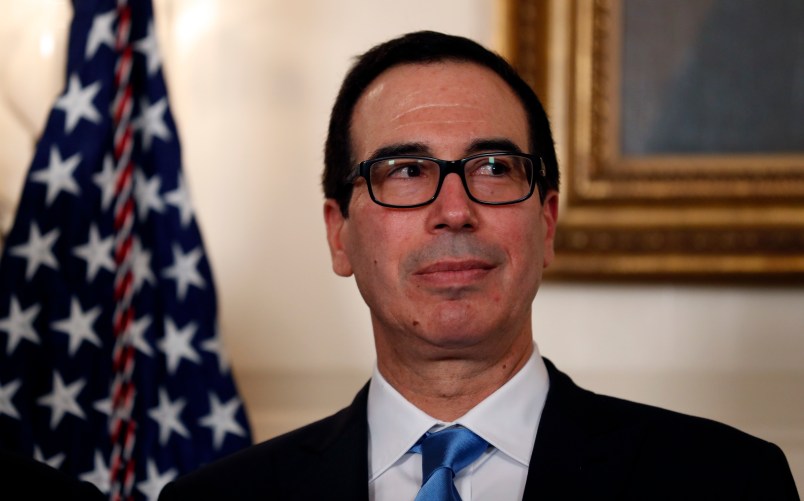The Treasury Department’s office of the inspector general found this week that Treasury Secretary Steven Mnuchin did not violate any laws with his use of government planes, but it also criticized the agency for the skimpy justification offered for Mnuchin’s travel on government planes.
The inspector general’s office reviewed Mnuchin’s air travel following reports indicating that the treasury secretary may have planned a trip to Kentucky on a government plane around the opportunity to view the solar eclipse. The watchdog found that there was no evidence to suggest Mnuchin planned the trip around the solar eclipse.
Several other Cabinet leaders are also under review by inspectors general for their use of non-commercial planes, and Tom Price recently resigned as health and human services secretary over his extensive use of charter planes.
Mnuchin has used government planes seven times this year, with approved plans to use a government aircraft an eighth time, OIG Counsel Rich Delmar found. Mnuchin requested the use of a government plane a ninth time—for his honeymoon—but withdrew that request, Delmar said. The flights so far have cost taxpayers more than $800,000, the report found.
“I see no violation of law in these requests and uses,” Delmar wrote in a report obtained by several news outlets late Thursday.
However, Delmar warned the Treasury Department to offer a more thorough justification for future requests.
“What is of concern is a disconnect between the standard of proof called for in the Daley memo, and the actual amount of proof provided by Treasury and accepted by the White House in justifying these trip requests,” he wrote. “My summaries show that in almost all cases a single boilerplate statement constituted the whole analysis and justification for designation and use of military aircraft, despite the fact that the memo clearly calls for a more rigorous and complete provision of facts and arguments.”
Delmar was referring to a 2011 memo from William Daley, then the White House chief of staff, laying out the procedures for administration officials to request use of government planes for White House support missions. All of Mnuchin’s requests were classified as White House support missions, for which the President must have directed that the travel to occur. To be designated as a White House support mission, officials must also show that commercial options were not available, that a government plane would be more cost-effective, that a government plane is necessary for national security concerns, or that other “compelling operational considerations” make a government plane necessary.
Delmar added that the Office of Management and Budget last week issued a new memo calling for more rigorous justifications for non-commercial air travel and urged the Treasury Department to “be ready to justify government air in greater detail, especially regarding cost comparisons and needs for security and other special factors.”
Mnuchin used government planes for travel abroad and within the United States. One round-trip journey on a military plane to Miami cost $43,725.50, while commercial air would have cost $688, the inspector general’s report said. For that trip, the Treasury Department said that Mnuchin needed the plane to make a secure phone call, whereas for some of the other trips the department only said that the plane and secure communications were required “given the potential for developments during travel related to a number of issues.”










